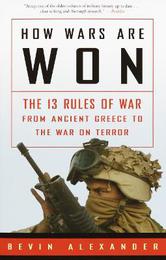
|
How Wars Are Won: The 13 Rules of War from Ancient Greece to the War on Terror
Paperback / softback
Main Details
| Title |
How Wars Are Won: The 13 Rules of War from Ancient Greece to the War on Terror
|
| Authors and Contributors |
By (author) Bevin Alexander
|
| Physical Properties |
| Format:Paperback / softback | | Pages:416 | | Dimensions(mm): Height 234,Width 156 |
|
| Category/Genre | History |
|---|
| ISBN/Barcode |
9781400049486
|
| Classifications | Dewey:355.02 |
|---|
| Audience | |
|---|
| Illustrations |
27 MAPS
|
|
Publishing Details |
| Publisher |
Random House USA Inc
|
| Imprint |
Crown Publishing Group, Division of Random House Inc
|
| Publication Date |
23 September 2003 |
| Publication Country |
United States
|
Description
A fascinating history of how wars are won that introduces the 13 rules of war and how they have proved decisive in battles through all of world history. Alexander places emphasis on how these rules must be applied to the new kind of war on terrorism. HOW WARS ARE WON introduces readers to the 13 rules of warfare and shows how throughout history, military victory has depended upon the successful application of these rules. The book also shows that knowing which of these rules to follow, and how to adapt them to the current challenges, will prove decisive in the war against terrorism. Military historian Bevin Alexander devotes a chapter to each rule, and for each he offers riveting accounts of four or five battles that were won or lost because of either the successful or unsuccessful application of that rule. One of these rules is that of the feigned retreat- pretend to be defeated, feign a retreat, and then ambush your enemy when they pursue you. This rule is especially relevant to guerilla-style warfare, and was used to devastating effect by the North Vietnamese against US forces in the Vietnam War. The battles included are bom famous and little known, and they range from the time of Alexander the Great up through the 20th century. Along the way, Alexander profiles the greatest military commanders, such as Genghis Khan, Napoleon, Stonewall Jackson (whom he identifies as a better general than Robert E. Lee), Erwin Rommel, a.k.a. the Desert Fox, and George Patton. The book also tells the fascinating story of the ways in which new technologies have created new opportunities and challenges in warfare and how they have been used to brilliant effect by some commanders and to horrible effect by others. Alexander emphasizes that even as the technolog that even heading into this new 21st century-styl tactics with which to win. ry of war constantly changes, the underlying rules of engagement remain the same, and e war, we can use the lessons of history to guide us in shaping the new strategies and tactics with which to win.
Author Biography
Bevin Alexander is the author of seven books of military history, including How Hitler Could Have Won World War II and Lost Victories, which was named by the Civil War Book Review as one of the seventeen books that have most transformed Civil War scholarship. He was an advisor to the Rand Corporation for a recent study on future warfare and was a participant in a recent war game simulation run by the Training and Doctrine Command of the U.S. army. His battle studies of the Korean War, written during his decorated service as a combat historian, are stored in the National Archives in Washington, D.C. He lives in Bremo Bluff, Virginia. From the Hardcover edition.
|